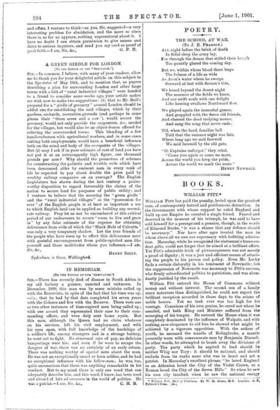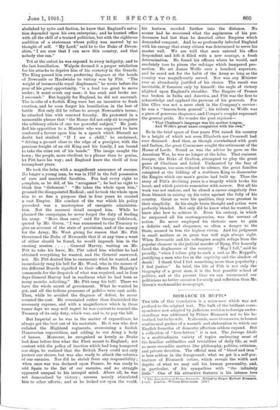B 0 0 KS.
WILLIAM PITT.* WILLIAM PITT has paid the penalty, levied upon the greatest men, of contemporary hatred and posthumous detraction. In the Government with whose support he ruled England and built up our Empire he counted a single friend. Feared and deserted in the moment of his triumph, he was said to have sold himself for a peerage and a pension, though, in the words of Edmund Burke, "it was a shame that any defence should be necessary." Nor have after ages treated the man to whom above all we owe our supremacy with befitting admira- tion. Macaulay, while he recognised the statesman's transcen- dent gifts, could not forget that he aimed at a brilliant effect. Yet Pitt's admirable trick of picturesqueness was not merely a proof of dignity ; it was a just and efficient means of attach- ing the people to his person and policy. Even Mr. Lecky finds a certain disloyalty in his treatment of Newcastle; but the suppression of Newcastle was necessary to Pitt's success, who firmly subordinated politics to patriotism, and was abun- dantly justified by the result.
William Pitt entered the House of Commons without money and without interest. The second son of a family more notorious than distinguished, he could not expect the brilliant reception accorded in those days to the scions of noble houses. Yet no task ever was too high for his courage. Conscious of his own genius, he cared not whom he assailed, and both King and Minister suffered from the scourging of his tongue. He entered the House when it was completely dominated by the influence of Walpole, and with nothing save eloquence to aid him he showed what might be achieved by a vigorous opposition. With the ardour of youth, he assumed the mantle of Bolingbroke, a mantle presently worn with consummate ease by Benjamin Disraeli. In other words, he attempted to brush away the divisions of party. The party which he aspired to lead should be neither Whig nor Tory: it should be national, and should exclude from its ranks none who was in heart and act a patriot. In Macaulay's excellent phrase, "he loved England as an Athenian loved the City of the Violet Crown, as a• Roman loved the City of the Seven Hills." So when he saw his own city insulted, when he saw the national energy • Waliam Pitt, Earl of Chatham. By W. Groan, k.r. London : 0. P. Putnanin Sons. [52.1
abolished by spite and faction, he knew that England's salva- tion depended upon his own enterprise; and he hunted office with all the skill of a trained politician, but with the righteous ambition of a statesman whose policy was marred by no thought of self. "My Lord," said he to the Duke of Devon- shire, "I am sure that I can save this country, and that nobody else can." _ Yet at the outset he was exposed to every indignity; and to the last humiliation. Walpole deemed it a proper retaliation for his attacks to deprive him of his cornetcy in the Guards. The King passed him over, preferring disgrace at the hands of Newcastle or Hardwicke to victory won by Pitt. "The weight of irremovable royal displeasure," he wrote before the year of his great opportunity, "is a load too great to move under ; it must crush any man; it has sunk and broke me. I succumb." But happily for England, he did not succumb. The insults of a foolish King were but an incentive to fresh exertion, and he soon forgot his humiliation in the lust of battle Not only did he refuse to accept Newcastle's terms; he attacked him with renewed ferocity. He protested in a memorable phrase that "the House did not only sit to register the arbitrary edicts of one too powerful subject." He justi- fied his opposition to a Minister who was supposed to have conferred a favour upon him in a speech which Disraeli no doubt had studied. "If I see a child," he exclaimed, "driving a go-cart close to the edge of a precipice, with the precious freight of an old King and his family, I am bound to take the reins out of his hands." The image caught the town ; the people, more obedient to a phrase than to genius, let Pitt have his way; and England knew the thrill of four triumphant years.
He took the helm with a magnificent assurance of success. No longer a young man, he was in 1757 in the full possession of rare and masterful faculties. Fox had every right to complain, as he did, of his " arrogance " ; he had no right to think him "dishonest." "He takes the whole upon him," groaned the disappointed Radical ; and he took the whole upon him to so fine a purpose that in four years he created a vast Empire. His conduct of the war which his policy provoked was a masterpiece of energetic administra- tion. Not the meanest detail escaped him. While he planned the campaigns, he never forgot the duty of feeding his army. "More than once," said Sir George Colebrook, quoted by Mr. Green, "I was summoned to the Treasury to give an account of the state of provisions, and of the money for the Army, Mr. West giving for reason that Mr. Pitt threatened the Duke of Newcastle that if at any time a want of either should be found, he would impeach him in the
ensuing session General Harvey, waiting on Mr. Pitt to take his leave, Mr. Pitt asked him whether he had obtained everything he wanted, and the General answered, not. Mr. Pitt desired him to enumerate what he wanted, and immediately rang his bell for Mr. Wood, who in the names of the different Boards signified to their officers His Majesty's commands for the despatch of what was required, and in four days General Harvey had in readiness what he had been as many months soliciting." Mr. Pitt rang his bell! There we have the whole secret of government. What he wanted he got, and all the tedious processes of politics were cast aside. Thus, while he avoided the disgrace of defeat, he never counted the cost. He overstated rather than diminished the necessary expense, and with a magnificence which in these tamer days we may well regret he was content to remind the Treasury of its only duty, which was, and is, to pay the bill.
But Imperial as he was in the matter of expenditure, he always got the best out of his materials. He it was who first enlisted the Highland regiments, overcoming a foolish Hanoverian superstition, and adding to our Army a body of heroes. Moreover, he recognised as keenly as Drake had done before him what the Fleet meant to England ; not content with the policy of inaction which had long hampered our ships, he realised that the British Navy could not only protect our shores, but was also ready to attack the colonies of our enemies. Nor did he shrink from any responsibility ; when once war was declared upon France, he was ready to add Spain to the list of our enemies, and no struggle appeared unequal to his intrepid mind. Above all, he was not demoralised by victory ; success merely stimulated him to other efforts ; and as he looked out upon the world,
his horizon receded further into the distance. No sooner had he recovered what the supineness of his pre- decessors had lost than he descried other Empires which demanded conquest. And he so profoundly infected England with his energy that every citizen was determined to serve his master well. We are told that men entered his office despondent and left it filled with a new courage, a fresh determination. He found his officers where he would, and resolutely tore to pieces the red-tape which hampered pro- motion. He set James Wolfe over a hundred superiors, and he cared not for the habit of the Army so long as the country was magnificently served. Nor was any Minister ever so abundantly justified of his choice. The result was inevitable, if foreseen only by himself: the eagle of victory alighted upon England's shoulder. The Empire of France was broken in India and America, and Pitt was the first to acknowledge and applaud the prowess of his generals. For him Clive was not a mere clerk in the Company's service : he was a "heaven-born general " ; his tribute to Wolfe was a piece of generous eloquence, and Cowper's couplet expressed the general pride. No wonder the poet rejoiced-
" That Chatham's language was his mother tongue, And Wolfe's great name compatriot with his own."
So in the brief space of four years Pitt raised his country to a height of which not even Elizabeth nor Cromwell had ever dreamed. And then, as though o'erwhelmed with gout and faction, the great Commoner sought the retirement of the House of Lords. Sound as was the advice he gave on the American War, he was no longer at the helm. That eminent lounger, the Duke of Grafton, attempted to play the great game of Chatham and failed. Undaunted by the fear of Pitt's tongue, too soon reduced to silence, the great families conspired at the bidding of a stubborn King to dismember the Empire which one man's genius had built up. Thus the story of Pitt's declining years is a tragedy which broke his heart, and which patriots remember with sorrow. But all his work was not undone, and he closed a career singularly free from blemish in raising up his voice against the folly of his country. Great as were his qualities, they were greatest in their simplicity. In his single brain thought and action were perfectly blended. Not only did he know what he wanted, he knew also how to achieve it. Even his oratory, in which he surpassed all his contemporaries, was the servant of action. He never employed his rhetoric save to gain a definite end, and eloquence, so often a danger to the State, seemed in him the highest virtue. And his judgment in small matters as in great was well nigh always right. When Newcastle and his colleagues sought refuge from the popular clamour in the judicial murder of Byng, Pitt honestly faced the displeasure of the country. "May I fall," said he proudly, "when I refuse pity to such a suit as Mr. Keppers, justifying a man who lies in the captivity and the'shadow of death ! I thank God I feel something more than popularity ; I feel justice." In brief, the life of Pitt is not only the biography of a great man, it is the best possible school of politics, and at the present time we can recommend our politicians no better occasion for study and reflection than Mr. Green's workmanlike monograph.







































 Previous page
Previous page